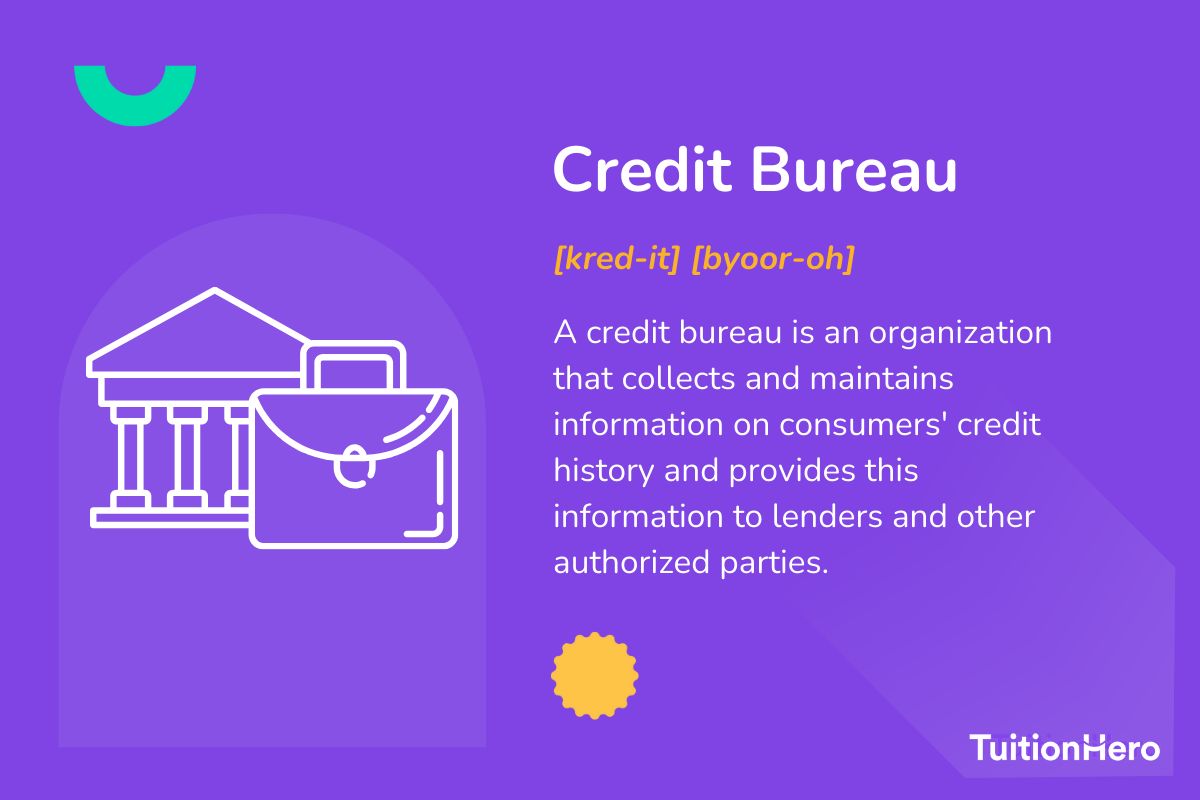Advertiser Disclosure
Last update: November 17, 2024
5 minutes read
What Is a Credit Bureau?
Explore the ins and outs of credit bureaus, how they work, and why they matter. Learn about credit reporting, credit scores, and more!

By Brian Flaherty, B.A. Economics
Edited by Rachel Lauren, B.A. in Business and Political Economy
Learn more about our editorial standards



By Brian Flaherty, B.A. Economics
Edited by Rachel Lauren, B.A. in Business and Political Economy
Learn more about our editorial standards
Have you ever wondered how lenders seem to know so much about you before offering you a credit card or a mortgage? The invisible but consequential hand behind this knowledge is often the credit bureau, a relatively unglamorous yet crucial component of modern financial systems.

Key takeaways
- Credit bureaus collect and maintain financial data to create your credit report
- Incorrect information on your credit report can be disputed and corrected
- Frequent credit report checks are important for major financial decisions
What is the credit bureau?
A credit bureau is a specialized agency that collects, maintains, and shares credit-related information about people and businesses. Lenders use this information to evaluate the creditworthiness of applicants and make informed decisions about extending credit.
Understanding how credit bureaus operate is crucial, as it can affect your ability to secure loans or credit for many purposes, like purchasing a home or renting a property. The three largest credit bureaus in the US, which control most of the market, are:
- Equifax
- Experian
- Transunion

Equifax
Equifax, founded in 1899, is a major player in the global credit reporting field. It manages financial data for over 800 million individuals and 88 million businesses worldwide, providing credit reports, scores, and fraud-protection services.
Experian
Experian, based in Dublin, Ireland, operates in over 37 countries. It offers traditional credit reports, scores, fraud prevention services, and marketing and business analytics solutions. Experian’s role is influencing consumer lending and providing businesses with critical data analytics for informed decision-making.
TransUnion
TransUnion, established in 1968, specializes in credit information and risk management. It provides comprehensive services, including credit reports, fraud and identity theft solutions, and data breach services.
What do these agencies collect?
These agencies are professional data scavengers. Here's what's on their radar:
- Personal information: Name, Social Security number, birth date, and more.
- Credit accounts: Your credit cards, mortgages, and other loans.
- Public records: Bankruptcies or tax liens, if any.
- Inquiries: Who has checked your credit recently.
- Payment history: Yes, and they even know if you were late on that utility bill in college.
They compile all this into a credit report, which is essentially your financial report card.
So where do they get iheir Info?
When you sign up for a credit card or a loan, you agree to allow the lender to share that info with the credit bureaus. Even some landlords will report your rent payments to the credit bureaus. They update these credit bureaus with all the latest information—your account status and payment history.
Those snapshots then get boiled down into your credit score, a 3-digit number that decides your financial fate. Lenders look at your credit score—usually between 300 and 850—to determine your creditworthiness.
The good news is that you're not stuck in this financial snapshot forever. Here are 4 actionable steps to improve your credit score:
- Check your report: Look for errors. Yes, they happen. Actually, according to the Federal Trade Commission, more than 1 in 5 people have errors on their credit report. Each credit bureau has portals to report errors, which often can take a few months to prove and remove.
- Pay on time: As if you needed another reason to avoid late fees.
- Reduce credit utilization: Keep your credit card balance below 30% of your credit limit. You can do this by either paying down some of your cards, or by calling your credit card company and asking for a higher credit limit (and then not using it, of course).
- Diversify: A mix of credit types can actually boost your score.
What is the credit score range?
In short, higher scores open doors; lower scores slam them shut.
- High score (700+): Easier loan approvals, lower interest rates.
- Medium score (600-700): Approvals are easier but at higher interest rates.
- Low score (<600): Getting a loan could be like pulling teeth.
Action | Expected Outcome | Timeline |
|---|---|---|
Check Your Report | Spot and correct errors | Immediate |
Pay On Time | Build a consistent history | 6-12 months |
Reduce Credit Utilization | Improve credit-to-debt ratio | 1-3 months |
Diversify | Signal financial stability to lenders | Over 12 months |
Your right to free reports
Thanks to the Fair and Accurate Credit Transactions (FACT) Act you get a right to 1 free credit report from each of these bureaus every year.
If you’ve been dealt a bad hand recently, like being denied credit, you're job-hunting while unemployed, you're on public assistance, or someone's been playing dirty with your identity, you're entitled to extra free reports.
Plus, many mobile apps will give you a free credit report every month, like Credit Karma, or even some of your banking apps.
Compare private student loans now
TuitionHero simplifies your student loan decision, with multiple top loans side-by-side.
Compare Rates
Dos and don'ts
Navigating credit can be tricky, especially when dealing with credit bureaus. To make things simpler, here are some straightforward tips to keep in mind.
Do
Check your credit report regularly
Pay off debts on time
Use credit responsibly
Build a diversified credit mix
Negotiate with creditors
Don't
Ignore errors in your report
Miss or make late payments
Max out your credit cards
Apply for multiple new accounts in a short time
Assume the worst and avoid communication

Why trust TuitionHero
Credit scores can be confusing, especially for students and parents planning for education. TuitionHero offers support to simplify this process, providing information on private student loans, refinancing, FAFSA help, and credit card offers. We guide you through credit to ensure you succeed educationally and financially.
Frequently asked questions (FAQ)
If you find incorrect information on your credit report, you should report it to the credit bureau immediately. You usually have to fill out a dispute form and provide evidence to prove the inaccuracy. The credit bureau generally has 30 days to investigate and remove or correct the information. So, it's in your best interest to keep an eye out and ensure everything on your report is accurate.
You're entitled to 1 free credit report every 12 months from each of the 3 major credit bureaus. However, if you're planning to make a big financial move, like buying a home or car, it's advisable to check your report more frequently. Consider using services that provide free, less-detailed credit reports to keep tabs on your standing.
Yes, it's possible but unlikely. Your credit score is like the tip of the iceberg; it's what people see first, but there's a lot more underneath. You could have an okay credit score but also have negative marks on your report, like a bankruptcy that's about to fall off the record. While the score gives a quick overview, the report provides the details, and both are scrutinized during big financial transactions.
Closing a credit card account can affect your credit score, mainly by hurting your credit utilization ratio and the length of your credit history. If you close an account, especially one that has a high limit and no balance, your credit utilization ratio will likely increase, which can negatively impact your score. Also, closing your oldest credit card could shorten your credit history, another red flag for lenders.
Final thoughts
From the inner workings of credit bureaus to how they affect your life, it's clear that understanding this system is crucial for your financial health. It's like going to the gym but for your credit score. Keep tabs on it, work on improving it, and never underestimate its effects.
Source
- Common errors people find on their credit report - and how to get them fixed
- The average credit score by age, state, and year.
- How Gen Zers Use Their Credit Cards | LendingTree.
- What Is the Average Credit Score in the U.S.?
- New York Fed Quarterly Report on Household Debt and Credit
- Federal Trade Commission: Report to Congress
Author

Brian Flaherty
Brian is a graduate of the University of Virginia where he earned a B.A. in Economics. After graduation, Brian spent four years working at a wealth management firm advising high-net-worth investors and institutions. During his time there, he passed the rigorous Series 65 exam and rose to a high-level strategy position.
Editor

Rachel Lauren
Rachel Lauren is the co-founder and COO of Debbie, a tech startup that offers an app to help people pay off their credit card debt for good through rewards and behavioral psychology. She was previously a venture capital investor at BDMI, as well as an equity research analyst at Credit Suisse.
At TuitionHero, we're not just passionate about our work - we take immense pride in it. Our dedicated team of writers diligently follows strict editorial standards, ensuring that every piece of content we publish is accurate, current, and highly valuable. We don't just strive for quality; we aim for excellence.
Related posts
While you're at it, here are some other college finance-related blog posts you might be interested in.
Shop and compare student financing options - 100% free!

Always free, always fast
TuitionHero is 100% free to use. Here, you can instantly view and compare multiple top lenders side-by-side.

Won’t affect credit score
Don’t worry – checking your rates with TuitionHero never impacts your credit score!

Safe and secure
We take your information's security seriously. We apply industry best practices to ensure your data is safe.
Finished scrolling? Start saving & find your private student loan rate today
Compare Personalized Rates




